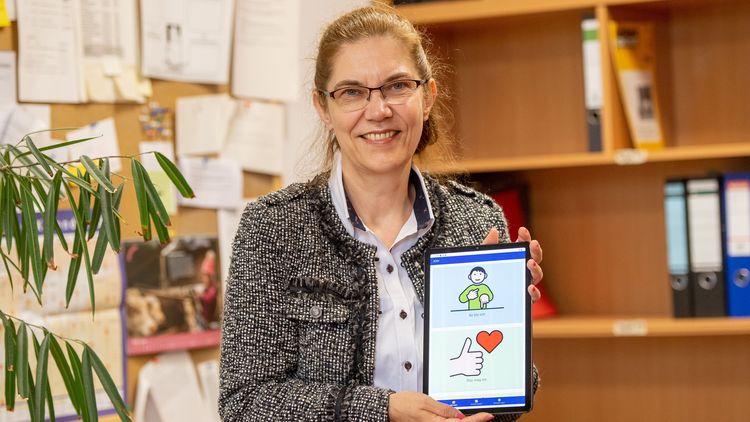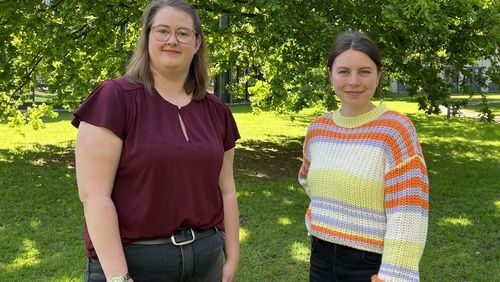Straight from the special school to a sheltered workshop: for many young people with intellectual disabilities this career trajectory seems preordained – yet their wishes and ideas are not particularly taken into account. Special education professor Andrea Erdélyi wants to change this with the help of designated toolkits.
Years ago, when Prof. Dr. Andrea Erdélyi was still working as a special education teacher at a school, a pupil with a learning disability told her about her career aspirations: she wanted to be a doctor – an impossible goal for a young person who would never obtain a higher education entrance qualification, let alone study at university. Erdélyi discussed the young woman’s motivation and passions with her and it turned out that her main ambition was to care for others in her work – just as she cared for her younger siblings. Together with her pupil, Erdélyi then set out to find her a suitable occupation.
Erdélyi has passed through many stages during her transition from spe-cial education teacher at a Bavarian school to her current post as Professor for Pedagogy and Didactics for Intellectual Disabilities at the University of Oldenburg. But in all the intervening years, her motivation has never changed: “I want people with intellectual disabilities to be listened to, and their ideas, wishes and goals to be taken seriously.“ But how to achieve this with young adults who have difficulties forming complete sentences?
Predefined life paths
In many cases the concepts and tools to simplify communication are lacking, for example during the transition from school to the workplace. This is where Erdélyi and her team come in: their two projects TiT (“Participation in the Transition Process“) and STABIL (“Self-determination and Participation for All in the Choice of Career and Education and Training“) develop concepts and materials – from work folders to apps – that are designed to help young adults express their own ideas and choices in cases where parents and carers would normally decide for them.
It is by no means standard procedure for young people with intellectual disabilities to be asked what sort of career they might want to pursue: “In many cases their lives are mapped out for them,“ says Erdélyi. Even today, many attend a special school right from the beginning. Those who are schooled on an inclusive basis usually switch to a special school after primary education. After that, they complete a two or three-year vocational training programme in a workshop for people with disabilities and then continue working there. According to a 2017 study by the German Economic Institute (“Institut der deutschen Wirtschaft“, IW), only about one percent
From pictograms to speech processors
Another reason why communication about career goals often fails for these young people is the limitations in their ability to express themselves. Yet under the generic term “Augmentative and Alternative Communication (AAC)“, there is a whole range of tried and tested communication tools that can be used by people with intellectual disabilities to make themselves understood – not only via complicated speech processors, but also using simple systems such as pictograms.
More than a quarter of the pupils at special schools in Lower Saxony rely on AAC, according to the results of a state-wide study jointly conducted by Erdélyi and her colleague Prof. Dr. Ingeborg Thümmel. However, only a small proportion of young people receive the help they need – partly because teachers are not sufficiently familiar with the various communication tools. According to Erdélyi, these tools can be particularly helpful in the critical phase of transition from special school to workplace – for two reasons: firstly, young people often either don’t have a clear plan for their career or are unable to articulate it. And secondly, teachers in the new environment are often not informed about whether a young person on their course needs AAC, or which forms of communication they use.
Easing the transition
Erdélyi and Thümmel addressed the issue in a previous project, developing a preliminary concept and work materials called the Oldenburg Box of Tools (OLBoT). Designed to ease the transition from school to workplace, the box contains a Future Folder, a Me Book and a Transition Protocol. The Transition Protocol is already a well-established tool, used by teachers to describe their pupils’ skills at the end of their school education. For this project, Erdélyi added the AAC aspect, allowing teachers to indicate whether a young adult relies on signs, pictures or speech generation devices for communication.
The Future Folder contains work materials for teachers to use when discussing career choices in class and to help young people to express their dreams, fears and aspirations. The Me Book is a folder in which young people can present themselves, their social environment, their interests, strengths, weaknesses and goals. When they fill out the work materials, the pupils generally use METACOM, an established AAC symbol system of more than 10,000 symbols, most of which are self-explanatory. The symbols are printed on small cards which pupils stick onto a booklet. They can stick a picture for “singing“ under the heading “I can do that“, for example.
Overcoming "acquired helplessness"
In TiT, their current research project, which like its predecessor is fund-d by the Federal Ministry of Labour and Social Affairs (BMAS), Erdélyi, Thümmel and their team have expanded and updated the OLBoT for young people from the 10th grade upwards, based on insights gained from their preliminary studies. It now contains a Transition Protocol and picture-based communication boards, as well as Bobbie – a Career Guidance Book for Educational Institutions. This is based on the earlier components, which have been revised, but also contains additional components that deal with gaining practical experience and setting objectives. Pupils can use it to explain what their dream job is or to express areas of learning that interest them.
This is the second step, however, not the first, because young people are often not aware of what they want and what their dreams are, Erdélyi explains. She refers to this as “acquired helplessness“: “When young people are used to others deciding for them, they don’t develop their own goals“. The researchers have therefore added information on a range of occupations so that school leavers can learn more about the typical activities involved in these jobs and assess their suitability.
Bobbie in practice
From the early stages of their research, Erdélyi and her team sought to work closely with the teaching staff at a special school, who tested the materials for the scientists and reported on their experiences. The researchers will continue to rely on this feedback in the future. After all, the main hurdle in the development of new work materials is the transition from development to practice: “A study from 1997 which was fundamental to our work shows that ultimately, about 75 percent of the innovations developed in research projects are not used in schools. With Bobbie, we want to avoid this at all costs,“ says Erdélyi. She and her team now plan to test the materials at 50 schools and with around 120 teachers across Germany.
The test design splits the teachers into three groups: the first group will be given Bobbie, along with explanations and ideas for designing lessons. A second group will receive additional support via a designated website where teachers can watch tutorials and exchange ideas with colleagues. The third group of teachers will also receive individual support from the researchers. The team plans to use the insights gained in this project to optimize the materials for regular use in schools and, above all, identify effective strategies for implementation.
An app for choosing the right profession
Financed by the Federal Ministry of Education and Research (BMBF), the STABIL project also focuses on developing materials to help with choosing a career. Together with partners from science and industry, Erdélyi focuses on school leavers or young adults working in workshops for disabled people who want to plan the next steps in their career. The emphasis here is therefore on a later stage of career orientation and training and on the development of digital work materials.
Oldenburg software companies are working with Erdélyi and her colleague Prof. Dr. Rudolf Schröder, Oldenburg Professor of Economic Education with a special emphasis on career orientation, to develop three interconnected apps, each with its own particular focus. The apps are designed to help teenagers and young adults – working together with their carers – to provide clear answers to questions about individual qualities and skills that are relevant to the workplace. They can also be used to find suitable training programmes.
Combining different means of communication
To develop a list of appropriate questions for their questionnaire, the researchers in Erdélyi’s team analysed competence assessment procedures and curricula, while Schröder’s team analysed training schemes for people with intellectual disabilities. They worked out which qualities and skills are most relevant for the individual occupations and formulated simple statements such as “I can take telephone calls“ or “I am very tidy“, together with a few simple response options. The app aims to provide useful partial results, even if respondents don’t manage to answer all the questions. Therefore, questions on the key competences required in a large number of occupations were placed at the beginning of the questionnaire.
The results of the first tests were very promising: many of the young people were highly motivated and focused when working on individual app modules, and were able to fill in the questionnaire independently, Erdélyi reports with satisfaction. This is also because the apps combine different means of communication, she explains: “Every statement is available in writing and in simple language and can be read out loud by the app“. A matching picture also appears for each question. At the end, the respondents receive feedback on their self-assessment.
Erdélyi and her colleagues plan to continue testing the apps in workshops and schools in 2021, to the extent that this is possible under the restrictions imposed due to the coronavirus pandemic. With this approach they hope to integrate parents, teachers, career advisers and trainers into the project, so that they, too, can use the app to provide input about the young adults under their supervision. Afterwards, young adults and their carers can discuss the results. “The important thing is to take the different results seriously – not only the assessment of the carers, but also the self-assessment of the young people“, Erdélyi emphasizes. “This is a good example of what the projects as a whole stand for: listening to what these young people have to say.“
This article was first published in the current issue of the research magazine EINBLICKE.




